
by Erica L. Meltzer | Jun 23, 2022 | CELPIP, ESL, IELTS, Vocabulary
The Critical Reader is excited to announce the sometime in the next few weeks (exact date TBA), we will be launching a free daily email idiom program for English learners.
If you would like to sign up, please enter your email in the form below. (Note that you must use the form to register; comments for this post have been disabled.)
The focus will be on words and phrases that can be used in IELTS Writing and Speaking, but the content will also be broadly relevant to other popular tests, including TOEFL, PTE, and (especially) CELPIP. And if you’re just looking to improve your English in general, you’re of course welcome to join as well.
Every day, members will receive an email with a new expression + definition, along with a sample sentence clearly illustrating its use. Both informal and formal language will be covered and labelled appropriately.
This program does not focus on the clichés commonly taught in ESL classes or on social media (e.g., A piece of cake, once in a blue moon) but rather on common, contemporary phrases and collocations that can help your speaking or writing sound more natural.
In addition, if there are any expressions you find particularly confusing or would like to have a better understanding of how to use, please feel free to let us know, and we will do our best to incorporate them into the program.

by Erica L. Meltzer | Dec 5, 2021 | IELTS, The Mental Game
In many way, IELTS Listening is as much a test of attention and multitasking as of aural comprehension. Regardless of accent, the recorded voices on the tape speak more slowly and clearly than people generally do in real life, and they do not use the kinds of slang* and idiomatic language that can be confusing to many non-native English speakers.
The difficulties of the Listening portion lie elsewhere, in processing the written information on the page and the spoken information on the recording at the same time, and in connecting one to the other. In principle, this is simple because the two convey the same information. However, they may not always be identical: the written portion may restate the recording word-for-word or, at certain points, it may paraphrase/condense the spoken part. When the latter occurs, it is easy to become confused and miss essential information simply because it takes you a few extra seconds to figure out which phrase or sentence on the page corresponds to what you are hearing. And in Listening, every second counts.
An additional challenge is that multiple-choice questions accompanied by a long list of answer choices are physically separated from the rest of the text, making it necessary to continually jump back and forth between different parts of the page while you listen. There’s a lot of content to manage, and if you spend just a couple of seconds too many re-reading an answer choice and stop paying close attention to the recording, you may miss the information you need to answer the following question. (more…)
by Erica L. Meltzer | Nov 15, 2021

To receive a high band score in IELTS writing, it is necessary to demonstrate that you are able to use idiomatic language in both Task 1 essays/letters (informal or formal, depending on the test and question) and Task 2 essays (always formal).
Unfortunately, most lists of so-called “IELTS idioms” available online include only informal and/or outdated expressions (clichés and proverbs) that are inappropriate for Task 2 and Academic Training Task 1 essays. The following list, in contrast, contains a variety of idioms and collocations (words frequently paired together) commonly used by contemporary native English speakers in business and academic writing.
While some of the phrases are relevant to specific topics, the focus is on expressions that can be used in responses to a wide range of questions.
You can also download this list as a PDF.
(An) Active/Sedentary lifestyle – lifestyle that involves a lot of/very little exercise
Example: When employees are required to work long hours, it is difficult for them to maintain an active lifestyle/it is easy for them to adopt a sedentary lifestyle.
Beside the point – not relevant to an argument
Example: Some people might argue that providing free treatment for diseases brought on by unhealthy lifestyle choices will encourage poor behavior, but that is beside the point.
Cost-effective solution – action designed to save money, usually in response to rising prices
Example: Some companies treat outsourcing as the most cost-effective solution to rising expenses.
A daunting task – large and overwhelming job or chore
Example: In a competitive housing market, purchasing a home can be a daunting task for many prospective buyers.
Financial incentive(s) – policy that allows people to get or save money to encourage a particular action or behavior
Example: Some cities may offer financial incentives to business owners in the form of tax breaks* and reduced startup fees.
*reduction in taxes
A/The key factor – something that contributes directly and significantly to a result
A key factor = one of many important factors
The key factor = the single most important factor
Example: A person’s work ethic is a key factor in the amount of professional success they achieve.
A major transformation – very significant change
Example: Over the last half-century, medical training has undergone a major transformation in many countries.
Natural affinity for – inborn skill or preference for
Example: It is evident that people are born with different talents: some people learn new languages easily, while others have a natural affinity for math(s) or science.
On the verge of (+ noun or verb + ing) – about to occur
Example: As a result of climate change and persistent drought, some countries are now on the verge of (experiencing) a serious humanitarian crisis.
On the whole – in general
Example: While money is certainly a significant consideration in one’s choice of career, I believe that on the whole, other factors should play an even more important role.
Pose a problem – More sophisticated way of saying “be a problem”
Example: The question of how to balance a demanding job with personal and family responsibilities poses a problem for many workers.
Primarily concerned with (+ noun or verb + ing) – mainly interested in or about
Example: A person who is primarily concerned with money (noun) may indeed find satisfaction in a finance career.
Example: A person who is primarily concerned with helping (verb + ing) others is well-suited to a career in a “caring” field such as nursing or social work.
Quality time – time spent with others (usually family or friends) devoted to enjoyment and building relationships
Example: When employees are required to work long hours and weekends, they are unable to spend quality time with their friends and family.
(Face) serious consequences – significant (negative) results
Example: Students usually face serious consequences if they are discovered to have plagiarized* or cheated on exams.
*plagiarize (n., plagiarism) – presenting someone else’s work as one’s own
In or A sharp contrast – large contrast
Example: 2015 saw average housing prices hit record highs, which was a* sharp contrast to the situation 2014.
Example: In sharp contrast to 2014, 2015 saw average housing prices hit record highs.
*This version is typically used after a form of of the verb to be.
A significant/substantial impact – a large effect (either positive or negative)
Example: The rising popularity of urban living has had a significant impact on the housing market in many cities.
Strictly necessary – absolutely necessary, essential
Example: Many employees work overtime and accept extra responsibilities, even when such things are not strictly necessary.
Take x for granted – to assume that something is true or accurate without giving any thought to it
Example: Most people take their health for granted until they fall ill.
Take into* account – consider
Example: Many people argue that providing free or low-cost treatment for diseases that result from poor lifestyle choices will only encourage to pursue bad habits, but they do not take into account such a policy’s effects on society as a whole.
*Note that even though this is a phrasal verb, it is commonly used in formal contexts.
The vast majority of – almost everyone, or almost all of something
Example: The vast majority of people would presumably agree that industrial manufacturers should not be allowed to determine environmental policy.
A wide/broad range – a large variety
Example: People reject high-paying jobs in favor of positions with lower compensation for a wide/broad range of reasons.
Like this? Want more? Download the FREE Short Guide to IELTS Grammar.


by Erica L. Meltzer | Oct 16, 2021 | IELTS
Fiona Wattam at IELTS Etc. recently put up an excellent post on some of the trickier aspects of using idioms well in IELTS essays, and it got me thinking about that topic as well. I think it’s fair to say that it’s a very popular subject: a quick Google search turns up almost four million results, some of which offer very contradictory advice.
I spent a lot of time thinking about idioms while writing (and repeatedly rewriting) that section of my IELTS grammar book, and at a certain point—perhaps after my tenth revision?—I came to a realization and finally managed to put the issue into words: using idioms is not the same as speaking or writing idiomatically.
I realize that statement might sound very contradictory so, to use a frequently memorized Task 1 General Training phrase, allow me to explain:
Essentially, the problem lies in the similarity of the terms idiom and idiomatic. One could very reasonably assume that they refer to the same thing, but in reality… not quite. (more…)

by Erica L. Meltzer | Feb 3, 2018 | Blog, GMAT
If you look at many lists of GMAT® idioms, you’ll likely find dozens upon dozens of preposition-based constructions, e.g. insist on, characteristic of, correlate with. Although the GMAT does sometimes test these types of idioms, it is important to understand that they are not the primary focus of the test. Because of an increase in the number of international students taking the exam, the GMAC has elected to shift the focus away from idiomatic American usage and toward more issues involving overall sentence logic.
That said, there are still a handful of fixed constructions that the GMAT does regularly test. Many, but not all, of these fall into the category of word pairs (aka correlative conjunctions). Particularly if you are not a native English speaker, you are best served by focusing on these constructions, which stand a high chance of appearing, as opposed to memorizing dozens of preposition-based idioms that have only a minuscule chance of being tested on any given exam. (more…)





